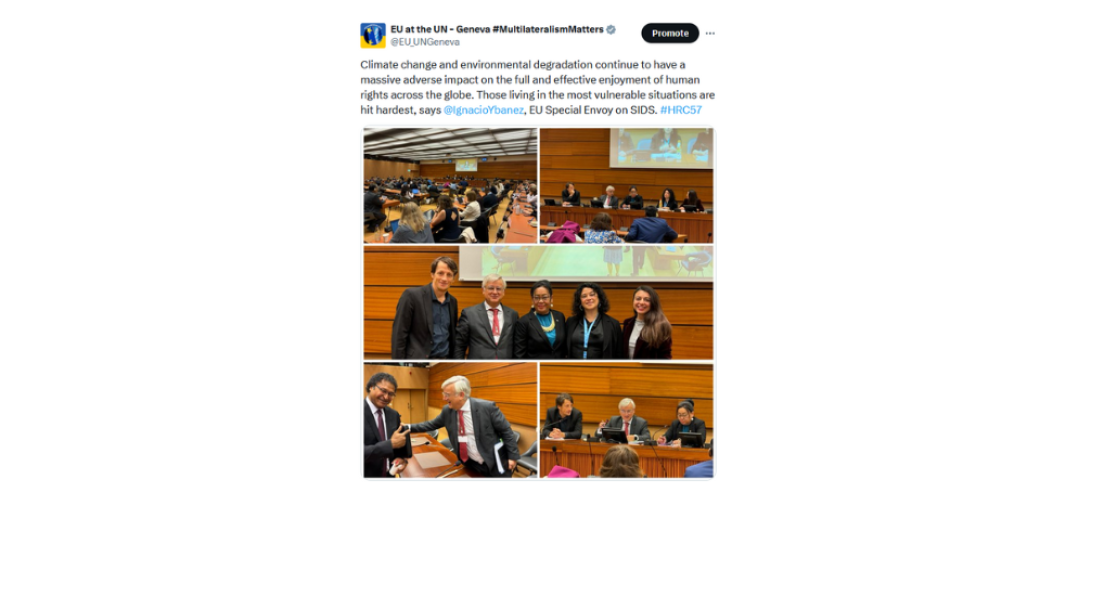Human Rights and Climate Change

On Thursday, 19 September 2024, the side event at the 57th Session of the Human Rights Council entitled "The Importance of Interconnectedness Between Human Rights and Combatting Climate Change" organised and co-sponsored by Fiji, the Bahamas, Panama, Paraguay, Sudan, the Marshall Islands, and the EU, brought together experts and stakeholders to emphasise how the global climate crisis impacts human rights, particularly for vulnerable communities, and how a human rights approach helps mitigating these impacts and support climate action.
The event featured a distinguished panel of speakers, moderated by Ambassador Doreen De Brum of the Marshall Islands. Among the speakers were Prof. Elisa Morgera, UN Special Rapporteur on Climate Change and Human Rights, Ms. Francesca Mingrone, from the Center for International Environmental Law (CIEL), Mr. Vance Culbert, from the International Institute for Sustainable Development (IISD), and Ambassador Ignacio Ybáñez, the EU Special Envoy for Small Island Developing States (SIDS).
Climate Action and Human Rights
Ambassador De Brum opened the discussion by highlighting the urgency of addressing climate change through a human rights lens. She called for solidarity with vulnerable States like the Marshall Islands, where rising sea levels and extreme weather events disproportionately impact local populations.
Ambassador Ignacio Ybáñez emphasized the critical role of the UN Special Rapporteur on Climate Change and Human Rights in supporting global climate action by framing it through a human rights perspective. He underscored the EU’s ongoing commitment to promoting the rights of persons in vulnerable situations, particularly in the context of climate change. At the 57th session of the Human Rights Council, the EU is a member of the cross-regional core group presenting a resolution on human rights and climate change led by the Marshall Islands and furthermore composed of the Bahamas, Fiji, Panama, Paraguay and Sudan.
He stressed the EU’s dedication to ensuring that climate policies prioritise those most affected while protecting human rights defenders who champion environmental causes. Further, Ybáñez referred to the EU’s will to continue fostering cooperation with international partners, ensuring human rights are central to climate change mitigation and adaptation strategies. In this context, he reiterated the EU’s solidarity with Small Island Developing States (SIDS) and acknowledged that they are among the most vulnerable to climate impacts.
"In climate action, primary attention needs to be paid to those most affected, including children, the elderly, Indigenous Peoples, and persons in vulnerable situations." Ignacio Ybáñez, EU Special Envoy for SIDS
Prof. Elisa Morgera, the UN Special Rapporteur on Climate Change and Human Rights, highlighted the need to renew the mandate of the rapporteurship, noting that climate change is fundamentally a human rights issue. She underlined that human rights are not an optional addition to climate solutions; rather, they provide the framework necessary to guide transformative change. Morgera hence stressed that failing to meet climate-related duties by states puts vulnerable groups at the greatest risk.
“Human rights are not a ‘top-up’, they are the way we address climate change.” Prof. Elisa Morgera, UN Special Rapporteur on Climate Change and Human Rights
Mr. Vance Culbert addressed the responsibilities of states, pointing out that despite the urgency of the climate crisis, fossil fuel subsidies continue, exacerbating global inequality. He highlighted that climate inaction violates fundamental rights, including the right to a healthy environment, to health as well as social and economic equality, as well as Indigenous Peoples’ rights. Culbert urged governments to reform subsidies and invest in clean energy, particularly in the Global South, while also incorporating oil and gas production in future human rights reviews.
Ms. Francesca Mingrone then noted the importance of using the human rights system to connect the Global North and South, whose divide has often polarised climate discussions at the HRC. She pointed out that science, especially through the work of the Intergovernmental Panel on Climate Change (IPCC), now widely recognises the interconnectedness of human rights and climate action. She therefore stressed that dialogue between different sectors, particularly science and policy, is essential to making real progress.
The event closed with a reminder that the interconnectedness between human rights and climate change is not only undeniable but also essential to fostering sustainable solutions that prioritise the most vulnerable communities. The EU, through its engagement in the HRC and cooperation with SIDS, remains committed to ensuring that human rights remain at the core of global climate action.

EU Geneva





